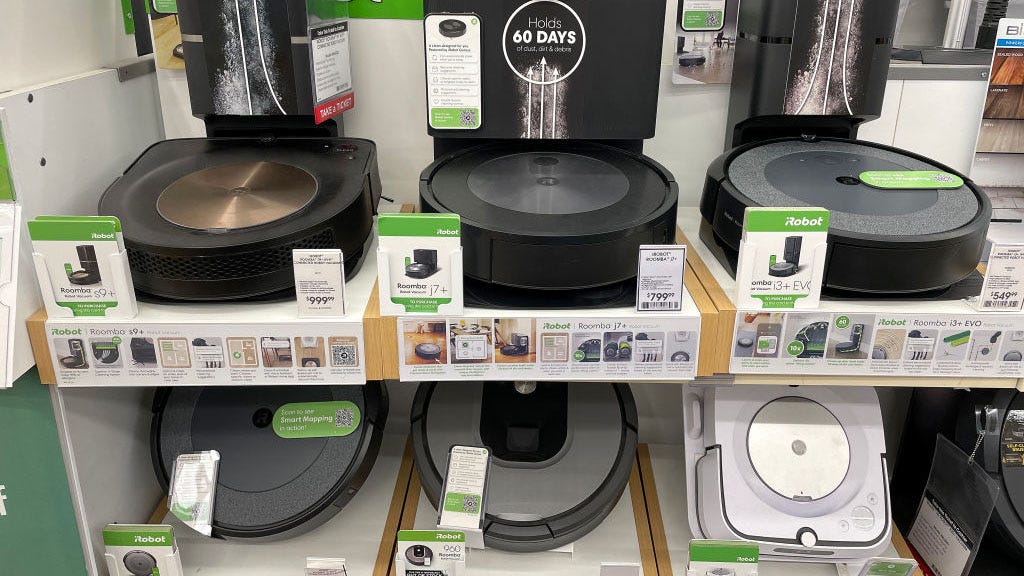Amazon is poised to own your Roomba – the internet is split on what this means
Is knowing where my sofa is located a security nightmare or meaningless data?
Yesterday, I outlined how Amazon’s $1.7b acquisition of Roomba maker iRobot is the latest in a long line of smart home acquisitions by the online retailer that’s stealthy become a leading IoT device maker. Just take a look at my research from that article:
📷 Blink for $90m in 2017 (home security cameras)
🚪 Ring for ~$1.2b in 2018 (video doorbells)
📶 eero for $97m in 2019 (consumer-friendly routers)
🤖 iRobot for $1.7b in 2022 (leading robot vacuum maker)
Less than 24 hours later, it appears as if the internet is divided on what Amazon’s Roomba purchase means: is it a straightforward play for a big name in the smart home space, or a nefarious way to hoover up your personal data?
The deal makes sense: Roombas are among the most popular robot vacuums you can buy today, and Amazon competes in other areas within the smart home category: smart speakers, video doorbells, security cameras and user-friendly WiFi routers. It doesn’t have a smart lights brand and, before this week, didn’t own a vacuum brand.
That changed this week, and opinions are falling into one of two buckets.
Danger, Will Robinson?
Ron Knox, a senior researcher and writer at the Institute for Local Self-Reliance, calls the acquisition “the most dangerous, threatening acquisition in [Amazon’s] history,” noting on Twitter that Roombas are in 40 million homes.
“[It’s] a company with perhaps the most data on the size, shape and layout of the inside of our homes,” he says in a multi-thread tweet. “From a privacy perspective, this is a nightmare.”

That drew brush back from about half of the replies. “Silly alarmist nonsense [typo corrected since there’s no Twitter edit button yet],” shot back Ali Kashani, “‘Knows where your furniture is’ 🤦♂️”
Kashani is the co-founder and CEO of Serve Robobitc, which suggests that it’s silly to “move 2-pound burrito in a 2-ton car.” The company advocates that its Serve robot is the future of sustainable, self-driving delivery.
I was surprised at how evenly people were split on their perspective of Amazon owning Roomba. It’s no secret that Amazon is very much a data-driven company, not just a simple online retailer. One user points out that Amazon already knows a lot about what you like from purchases and browsing habits at Whole Foods and IMDB.

There are privacy concerns with the potential of so much of our data being known by one company, but critics have a harder time spelling out how this is currently or will affect people outside of influencing your buying habits – and maybe that’s enough for people to be hesitant to want a Roomba. Half of the responders see it as a threat, and the other half seem to see it as a “feature.”
Trust or anti-trust?
Even the implications of it being an antitrust issue have people divided.
Roomba is the biggest name in robot vacuums and Amazon is the most popular online retail channel from which people make purchases – often discounting its own brands and creating tempting bundles during shopping “holidays” like Amazon Prime Day, the rumored Amazon Prime Fall event and Black Friday and Cyber Monday. There’s room for bias, even though the company had previously suggests it keeps things fair.
At the same time, it certainly has a lot of competition:
🟦 Samsung
🤖 Dyson (they make an expensive one)
⚡eufy (owned by Anker)
🦈 Shark
🔴 roborock
🧹Neato
☁️ Dreametech
🙃 Dozens of other brands we’ve never heard of before

The race to map out your home
Amazon isn’t the only company eager to help you map out your home. In addition to the aforementioned competition, Apple and Google smartphones are filled with AR-enabled apps that can help you measure your rooms and virtually place furniture into your all-too-small room or apartment.
Roomba vacuums may be more efficient at this mapping task. They can map out your floor plan without as much user intervention (i.e. holding up a smartphone and twirling around a room), and your floors should be clean by the end of this background task.
This could change the way accurate floor plans data is obtained in real estate and help you measure how much space you really have for that sofa. But there are tons of examples of how this could be intrusive for you… and your furry friends…
As Amazon’s Astro robot and Ring’s Always Home Cam make it clear, your home is the next frontier for Amazon and other tech companies. It’s up to users to draw the line to let major companies know what’s helpful and what should remain private. So far, with the feedback evenly divided, no one is making a winning argument.







I hesitate to mention, but dude is still at it, two weeks later, publishing an 'Amazon is basically Skynet' diatribe in a national magazine. A dozen hypotheticals starting with "my suspicion is ..." meant to frighten readers and validate the whopping chip on the author's shoulder against Amazon.
It's fair and necessary to be wary of privacy issues, but fear and conjecture only achieve the opposite. No weather forecast will say, "Storm! Run for your lives!" because facts and probability should form the foundation to vigilance and safety.